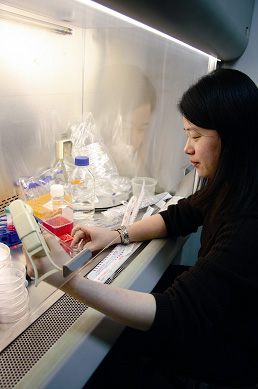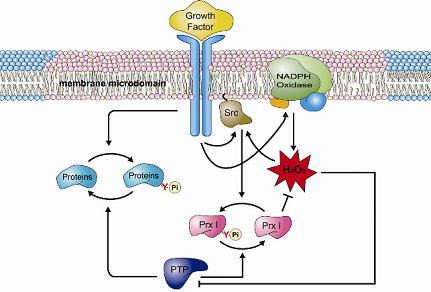
Professors Rhee Sue-goo (Life & Pharmaceutical Science) and Woo Hyun-ae (Life & Pharmaceutical Science) have discovered a way to control the overgrowth of cells, which is a cause of aging.
The two professors found that controlling the amount of hydrogen peroxide (H2O2) in the body can help cells maintain their youth for a longer period of time.
The discovery refuted the misconception that H2O2 is only responsible for cellular aging.
In fact, H2O2 generated around cell membranes sends a signal for cell activation, and small concentrations are necessary for cellular growth and communication.
Too much H2O2 however, can cause cells to grow too fast and age.
Through gene lock-out experiments on mice, Rhee and Woo found that the aging process can be slowed down by interaction of H2O2 and the enzyme peroxiredoxin (Prx) which was discovered by Rhee in 1988.
“It can be said that H2O2 functions like stress in a person’s daily life,” said Woo. “A small amount of stress motivates us in a positive way.”
Inactivation of the Prx in these areas temporarily allows the H2O2 to accumulate and this enables signals to pass from cell to cell.
“Certain amounts of H2O2 in a specific area, like the cell membrane works as a signaling tool and not as a toxic substance.”
When H2O2 is not needed for signaling, Prx removes the H2O2. This saves the cells from growing too fast, in other words, prevents aging.
Rhee and Woo’s discovery was made in connection with four fellow researchers at the Aging Research Center.
The research was published in Cell, a highly regarded global journal in the bioscience field.
“The study conducted by Woo and coworkers not only confirms and explains the unknown role of Prxs but also raises many new questions regarding Prxs and H2O2’s signaling,” commented Michael B. Toledano of the Laboratoire Stress Oxydants et Cancer in France through the paper in Cell.
In addition to its academic importance, the discovery also has promise for practical biotechnology and medicine. Since the two professors succeeded in revealing a mechanism for the inactivation of Prx, which can slow down the aging process, there are expectations for practical anti-aging treatments and also hopes of using the discovery to strengthen the immune system.
“Since what we discovered is basic science, it will take a long time to actually produce specific types of medicine or treatment based on the Prx mechanism,” said Professor Woo. “However, I hope that our research becomes a cornerstone for more specialized and partial treatment of diseases like cancer.”

